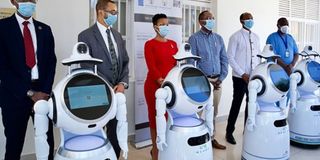Technology benefits that came with Covid-19 social distancing

Caption: Robots are being deployed to the front line in Rwanda's raging war against the novel coronavirus with officials saying this trail-blazing innovation could minimise if not eliminate the risk of infection for health workers treating people with the virus. PHOTO: APA NEWS
What you need to know:
The report, titled: “Reimagining Global Health through Artificial Intelligence: The Roadmap to AI Maturity,” was released on Wednesday September 9 by Microsoft and Novartis Foundation, revealing that low- and middle-income countries could soon leapfrog high-income countries in their adoption of new AI-enabled technologies in health.
Dar es Salaam. Reduced contact between patients and healthcare providers due to Covid-19 social distancing has led to major growth in technologies such as Artificial Intelligence (AI)-enabled diagnostics, says a new report that calls on governments to identify and test innovative ways to finance high tech in health solutions.
The report, titled: “Reimagining Global Health through Artificial Intelligence: The Roadmap to AI Maturity,” was released on Wednesday September 9 by Microsoft and Novartis Foundation, revealing that low- and middle-income countries could soon leapfrog high-income countries in their adoption of new AI-enabled technologies in health.
Accelerated by measures taken to avert transmission of the novel coronavirus, the adoption of digital health technology means that millions of people have sought digital health care solutions – presenting an opportunity for countries to integrate data and Artificial Intelligence (AI) into their health systems.
In Tanzania, and across many low and middle income countries, technologies such as mobile phone trading platforms, e-banking, e-commerce as well as block chain applications have often been adopted faster and more comprehensively.
Commenting on the report, the head of the Novartis Foundation and co-chair of the Broadband Commission Working Group on Digital and AI in Health, Dr Ann Aerts said, “Many countries are ill-prepared to address a new emerging disease such as Covid-19 in addition to the existing burden of infectious diseases and the ever-increasing tide of chronic diseases.”
“We have to develop a sustainable ecosystem for AI in health in the countries where it is most desperately needed,” urged Dr Aerts, adding: “This has to happen while ensuring fairness and access for all. As health systems build back after the pandemic, technological innovation has to be a core part of the agenda.”
By May this year, Rwanda, which is now arguably the most digitally connected health system in Africa, has had its virtual consulting service surging past two million users – one-third of the adult population.
In recent years, the Tanzanian technology ecosystem has been growing fast with more high-tech communities being established every day from the early days of Dar Google Technology User Group (DarGTUG), the Mozilla Community to Andela Learning Community, Tanzania Blockchain Community, Tanzania Developers Community as well as Tanzania Python Community.
Sub-Saharan Africa currently represents 12 per cent of the global population but faces 25 per cent of the world’s disease burden, while housing only 3 per cent of the world’s health workers.
A worldwide shortage of healthcare workers, which is particularly serious in many African countries, is predicted to reach 18 million by 2030.
This boosts the case for investment in supportive AI tools, which can help nurses and community health workers diagnose and treat illnesses traditionally seen by doctors.
“As examples in the report make clear, Africa could do more to build access to medical expertise by rolling out AI-based support tools alongside healthcare programs,” said Racey Muchilwa, Head of Novartis Sub-Saharan Africa.
AI is boosting access and improving outcomes while also cutting costs by identifying potential health problems before they actually occur.
According to Mr Paul Mitchell of Microsoft, who co-chaired the Working Group, Artificial Intelligence can have a big impact not just in lower-income countries, but across all health systems.
“It’s clear Covid-19 is driving massive change in the use of technology in health - we are seeing in a few months what I would have expected normally to take years, if not decades,” he said.
In rural areas of Rwanda, one doctor may serve as many as 60,000 people. The government is working with a private sector partner, Babylon Health, to give every person aged over 12 access to digital health consultations. More than 30 percent of Rwanda’s adult population has signed up. The new partnership will also see the introduction of an AI-powered triage and symptom checker platform.



